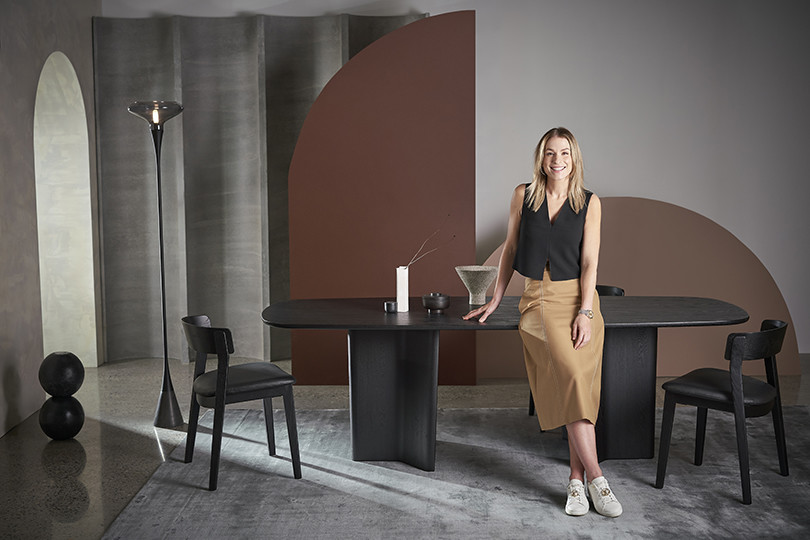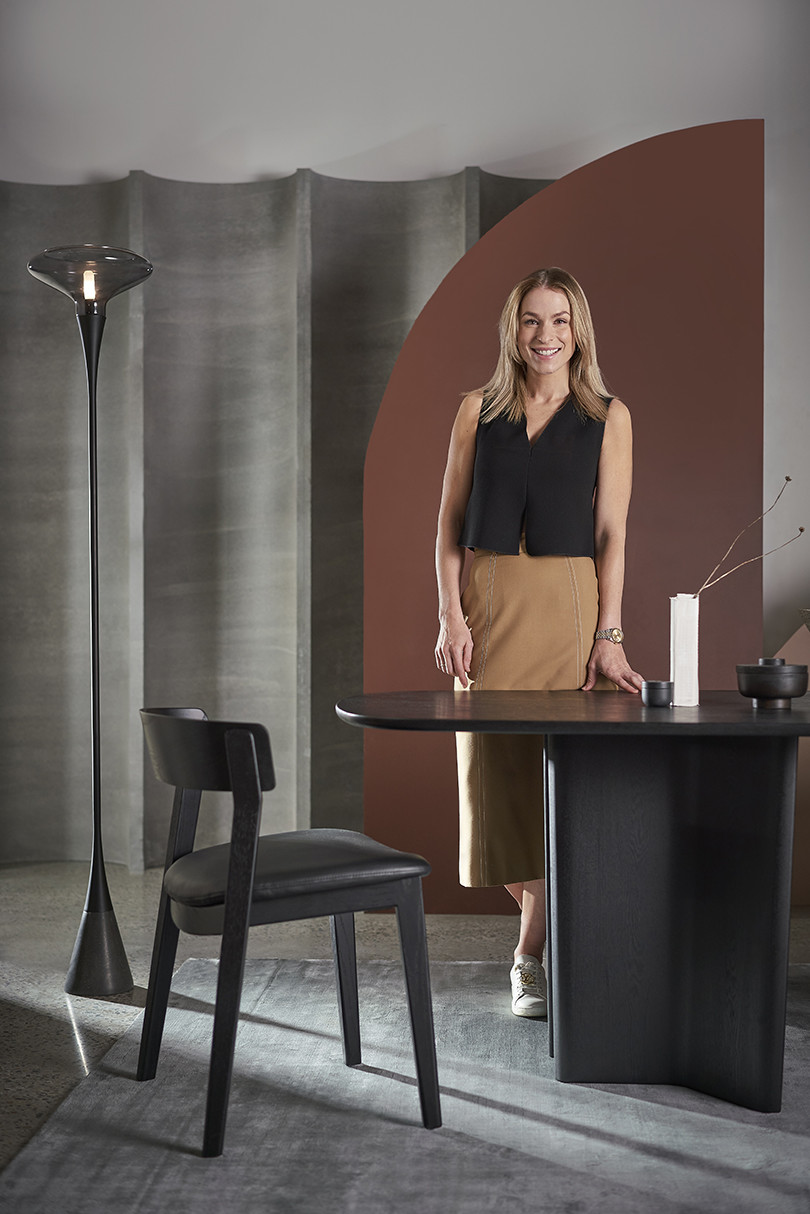While form, finish and function give body to a furniture piece, the ethics of its design and manufacture give it backbone. King’s global head of product, David Hardwick, along with two of the industry’s most respected designers, unpack the ethics of good design.

The Luna Chair by King.
February 18th, 2022
In a world of surfaces and slogans, integrity is one of the most desirable of qualities. It is that inherent sense of fairness, planetary kindness and humanistic ethos that gives an item an added allure and value. King has always held strongly to principles in design, manufacture and lifetime stewardship in everything it creates. According to David Hardwick global head of product at King, his personal ethics align with and inform the ethics of King design.
The humanist approach means being thoughtful about what the company is bringing into the world, he explains. It also shapes how the company manages the practical dimensions of materiality, making and client relationships. “Our sense of responsibility for bringing something onto this planet is that it must enhance the lives of people. We have always had that approach. It is a great responsibility, and we never absolve ourselves of it,” he says.
For Tom Mark Henry’s Jade Nottage, the ethical side is multi-faceted and is an important element in terms of transparency with clients. Visible and tangible ethical considerations validate the studio’s trustworthiness, Nottage says. “It is a driving force, and an important part of who we are as a business.”

Some of the general credentials she looks for include FSC certification for timbers, recycled content in carpets and other fabrics, and supplier end-of-life take-back programs. The studio is committed to being across these factors, and as a designer, Nottage says knowing materials will be taken back is a tangible positive. “We are always looking to improve on that. As designers, we are never stagnant [in our choices].
“We like to know where things are coming from and have a sense of their lifecycle. Most of the time, when we are looking for new suppliers and products, we know that many clients will also want to see the ethical or sustainability certificates products come with.”
King takes a lifecycle perspective of its products, with a commitment to ongoing stewardship. A piece may have left their premises, but it never leaves their orbit of concern. No matter how long it has been used and loved, it can be restored or repaired. And if it really has reached the end of useful life after several decades, they have a policy of always taking back products, disassembling them and returning the materials to the wider supply chain via recycling.

What is learned from feedback and from recovery of products also nourishes the design process, Hardwick explains. There is always learning, improvement and further innovation. The ethics of making – fair labour practices and honouring the value of diversity – is also part of this ethical framework.
While design, detailing, repair and management are based onshore in Australia, the majority of manufacturing occurs in the company’s wholly owned manufacturing facility in Shanghai. The level of staff loyalty and the depth of experience and skill in the workforce is something King takes great pride in.
“People stay with us because they love what the brand stands for,” Hardwick says.
The Australian design and workshops teams include people from cultural backgrounds spanning the globe, and Hardwick says this has evolved organically. These different attitudes and approaches bring innovation, richness and new ways of seeing that evolve the King Collections in innovative ways. The company also has people of diverse ability, and team members still working well past retirement age, because the value of their experience is cherished.
“It is just our attitude,” Hardwick says. “We are still a family business, and we bring those family values into the company.”

Longevity is one of the fundamental elements of good, ethical design, says Sophie Solomon of SSD Studio.
“The way I design interiors is quite loose fit. I like it to be timeless, so it doesn’t have to be redone.”
Solomon explains that having to deconstruct and reconstruct a major room like a kitchen ever few years because trends changed, or the lifestyle of the inhabitants changed is not sustainable. She begins by asking people about the way they envisage their lives unfolding. Designing for change and spaces that can evolve aligns with environmental considerations and is “fundamental”.
Solomon looks for materials that are durable, and thoughtfully considers ergonomics and practicality in spatial planning and in details such as skirtboards and additional storage. This emphasis on the practical is balanced by the element of beauty.
“I like the French style of blending elegant pieces with different textures,” she says. “That is why the words ‘timeless’ and ‘longevity’ resonate for me. It is about quality over quantity, and things that last are really important.”
SSD Studio
ssdstudio.com.au
Tom Mark Henry
tommarkhenry.studio
Photography: Tim Robinson
Styling: Lara Hutton
H&MUA: Wayne Chick
PhotographyAssistant: Corey Madden
Production: Eve Milburn
We think you might like this article about flexible furnishings for the future of work with King.
INDESIGN is on instagram
Follow @indesignlive
A searchable and comprehensive guide for specifying leading products and their suppliers
Keep up to date with the latest and greatest from our industry BFF's!

Gaggenau’s understated appliance fuses a carefully calibrated aesthetic of deliberate subtraction with an intuitive dynamism of culinary fluidity, unveiling a delightfully unrestricted spectrum of high-performing creativity.

Schneider Electric’s new range are making bulky outlets a thing of the past with the new UNICA X collection.

In this candid interview, the culinary mastermind behind Singapore’s Nouri and Appetite talks about food as an act of human connection that transcends borders and accolades, the crucial role of technology in preserving its unifying power, and finding a kindred spirit in Gaggenau’s reverence for tradition and relentless pursuit of innovation.

In design, the concept of absence is particularly powerful – it’s the abundant potential of deliberate non-presence that amplifies the impact of what is. And it is this realm of sophisticated subtraction that Gaggenau’s Dishwasher 400 Series so generously – and quietly – occupies.

DKO’s Koos de Keijzer and Michael Drescher bring us this personal report from Salone del Mobile 2025 in Milan.

In this edition of The Edit, take a closer look at Pedrali’s 36th showing at Salone, where spatial choreography, and new ideas in form, function and material come into view.
The internet never sleeps! Here's the stuff you might have missed

Global design powerhouse Hicham Lahlou joins Design Show Australia 2025 as keynote speaker and cultural ambassador.

Humanscale’s Chief Sustainability Officer is embarking on a tour of Australia, delivering a talk entitled: “Sustainable by Design: Materials Transparency for a Healthier Planet.” At the same time, the company opens a brand new showroom in Sydney. We met her to find out more.